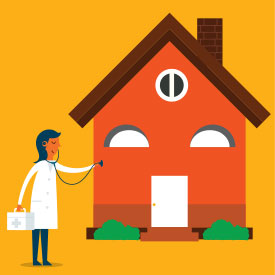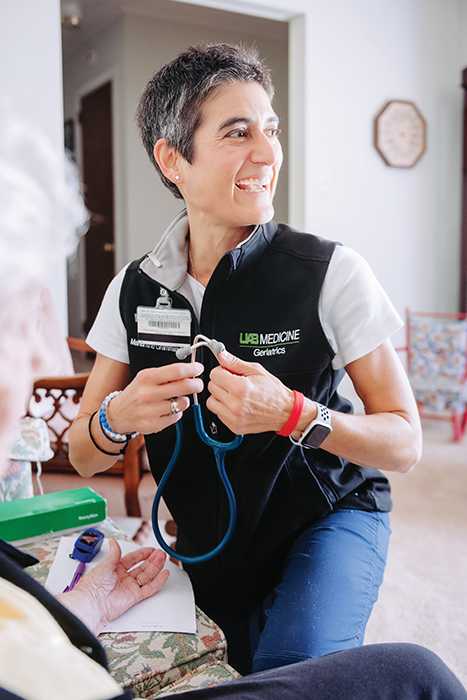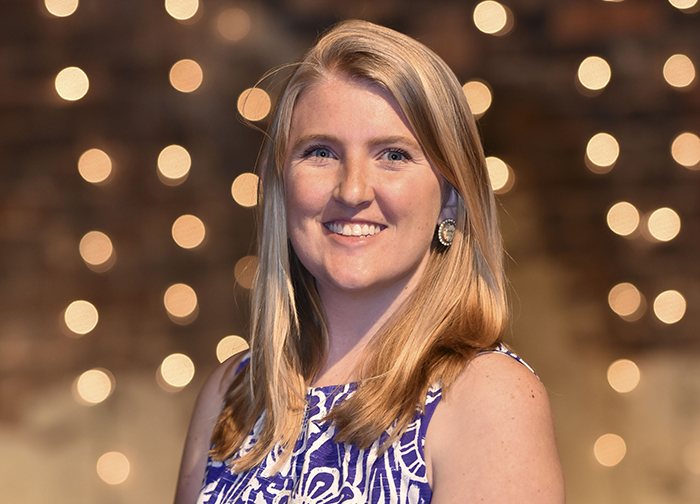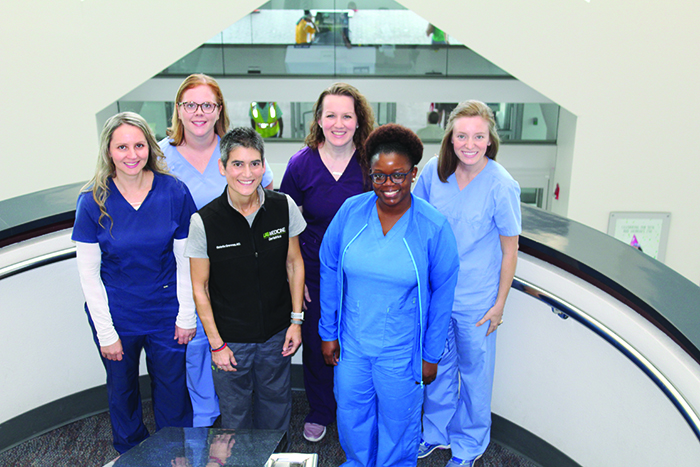 Increasingly frail and wary of doctors’ offices and hospitals, Michael Fox’s mother was the type of patient who inspired the 2015 creation of UAB House Calls. UAB House Calls offers a different kind of health care for geriatric and other physically vulnerable patients ages 18 and older by sending physicians and health care professionals to patients’ homes to provide care and treatment they might not otherwise receive.
Increasingly frail and wary of doctors’ offices and hospitals, Michael Fox’s mother was the type of patient who inspired the 2015 creation of UAB House Calls. UAB House Calls offers a different kind of health care for geriatric and other physically vulnerable patients ages 18 and older by sending physicians and health care professionals to patients’ homes to provide care and treatment they might not otherwise receive.
For Fox’s mother, receiving in-home care became her last hope of receiving medical attention. “She had had so many falls, broken bones, and accidents that she didn’t want to leave the house,” Fox remembers. “For us to know they would come out to see her was such a huge relief.”
UAB House Calls started as an informal arrangement several years ago with UAB Geriatrics seeing select patients at home as needed. In 2014, Marianthe Grammas, M.D., assistant professor in the Division of Gerontology, Geriatrics, and Palliative Care, became medical director of the Geriatric Medicine Clinic at UAB Hospital-Highlands. She seized on the program’s potential and formalized it. “I recognized the opportunity to develop a house calls program that allowed us to enroll patients through both the clinic and the hospital and eventually the community at large. These patients were unable to access primary care in the traditional setting and faced multiple barriers to their general health care,” Grammas says.
In an April 2018 letter to the House Calls staff, Fox explained the positive effect the program had on his family: “As you know, it’s very difficult trying to encourage, prepare, transport, and help geriatric patients understand why they need or have to go to the doctor for wellness and sick care,” he wrote. “This program has been a godsend for us.”

Marianthe Grammas directs the UAB House Calls Program and provides care for homebound patients on a regular basis. These home visits allow Grammas and her team to evaluate not only a patient’s health but also their home environment. It also enables the providers to communicate more closely with patients’ caregivers.
Measuring Success
Today, UAB House Calls sees about 30 patients every week, with an average census of 300. Grammas estimates the program has touched 850 patients’ lives since its inception. Many of them are geriatric patients, but the program serves patients 18 or older who face multiple medical problems or live with severe functional limitations. They also must live within the program’s footprint, which is a 30-mile radius around UAB.
Grammas says the program’s success is measured in a number of ways, both tangible and intangible. “Probably most important to all of our providers and our team is doing the right thing for the patient,” she says. “Many of our patients are homebound or bedbound. If we didn’t come to see them at home, they couldn’t access care in an easy way.”
Benefits to the UAB Health System include patients making fewer trips to the emergency room and requiring fewer hospitalizations for problems that could be treated or prevented with high-quality home care. “We looked at our data and saw we have reduced emergency department visits by half, reduced hospital admissions by a third to a half, and decreased 30-day readmissions by 90% among our House Calls patients,” she says. “We’ve had some really robust outcomes.”
Another measure of success lies in the satisfaction level among patients and their caregivers and families. After his mother passed away this past year, Fox requested the program for his father, who was also growing increasingly frail. Fox says he is especially grateful for the phone consultations the program offers to patients and their families. Recently, his father called him with fears that he was suffering a heart attack or stroke. “He thought he needed to go to the ER,” Fox says. “But he sounded OK to me, not at all like someone who was having a stroke or anything. I called the House Calls program and talked to a staff member, who agreed my dad didn’t seem to be in immediate danger. The House Calls provider came out the next day, took some bloodwork, and gave him a physical. My dad being spared a trip to the ER was a huge relief, because it would have taken a toll on him.”
Grammas says having House Calls providers accessible to patients and families by phone is a critical component. “Patients can communicate very easily with us,” she says. “We really drive home, ‘Call us first if you have any concerns at all—big or small—so we can help you understand what’s going on and help triage the situation.’ Sometimes we can see the patients on the same day or maybe the next day. We have the ability to order X-rays at home or get labs. We try to assess the situation in a timely manner and prevent an unnecessary or avoidable trip to the emergency room.”
Grammas notes that the House Calls program helps keep these medically vulnerable patients from entering the hospital, and it is often advantageous to this patient group and their providers. “We see the patient where they spend the majority of their time, which allows us to observe the social context,” she says. “We can ask questions to better understand their caregiving needs and their home environment: Is their space safe or cluttered? Is there food in the fridge? It’s a window into everything that’s going on with the patient. It can show the problems that the caregiver has with managing the patient, their diseases, emotional issues, and personal care needs. Seeing the patients at home turns out to be more efficient in some ways, because you get valuable information all at once.”
A Care Continuum
Brian Spraberry, chief administrative officer of UAB Heath System, sees the House Calls program as part of a larger effort at UAB to create a more responsive care continuum for patients that extends far beyond the hospital setting. “Traditionally, the acute care focus is episodic and relational to an inpatient admission,” Spraberry says. “Taking a more responsive approach to how we manage care throughout the care continuum is something that we want to be more involved in—that care should transcend the inpatient episode.”
Spraberry says home care is poised for significant growth because you can incorporate telemedicine and other new technologies into it. He and Grammas agree health care entities will have to work within the reimbursement system and with payers to create proper mechanisms to pay for the care of patients in the home.
Carson Klein, a fourth-year medical student from Beauregard, Alabama, conceived of another extension of the care continuum for seniors as her Schweitzer Fellows project. In 2017, Klein, who plans to practice family medicine, created the “Senior Companion” program, a School of Medicine service organization that organizes medical students to visit homebound seniors. She says her goal was to help counteract the negative effects of social isolation, which she observed from personal experience. “I had only one grandparent growing up, my grandfather,” Klein says. “We were really close to him. As he got older, he got dementia.”

Carson Klein, a fourth-year medical student, created the Senior Companion Program in the SOM as her Schweitzer Fellowship project.
She notes her family paid for a caregiver and spent some evenings caring for him at home. “Even with us being a very attentive family and trying to be there for him as much as we could, he was still very lonely,” Klein says.
Social isolation and a lack of resources are major issues in the elderly community. “There are so many people in the geriatric and elderly community who are homebound and just sit at home with their same routine,” says Klein. “Their whole world may be the one or two rooms they’re in.”
Klein says loneliness exacerbated her grandfather’s dementia and caused his overall health to deteriorate. She wanted to help prevent that from happening for others. “It has been shown that social isolation can negatively affect someone’s mental and physical health,” she says. “Most senior citizens love to talk to young people and ask them about their interests, and the seniors want to talk about their youth.”
Klein ran the program for the first year and personally paid visits to eight seniors on a regular basis. She also recruited other students to volunteer. The Senior Companion Program is now in its third year, and a new first-year medical student takes over running the program each year. The program’s scope is impressive, with 50-60 students having participated to date. Klein estimates that collectively the students have paid 150-200 visits to seniors who need and value their visits.
Klein says the nature of the visits can vary, depending on how much or how little support the seniors have on a regular basis. She notes that even those with spouses or other family members at home are eager to see a fresh face at the door, and their caregivers are happy, too. “The families recognize the need, because there is a burden on caregivers,” Klein says. “Students tell me that a lot of their visits turn into the four of them—the pair of students, the spouse, and the senior—all hanging out together. And it’s fun. It is almost as though they were also visiting the spouse. It’s an enjoyable visit for everyone involved.”
Both concepts—medical house calls and social visits—require a “cultural change and shift in thinking” about what is best for certain patients, Grammas says. “A lot of what we do is really about being creative and thinking outside the box in how we care for patients,” she says.

UAB House Calls team (clockwise from far left), Natalja Deineko, CCRN; Chaeli Lawson, CRNP; Jessica Nix, LMSW; Kathleen Shields, CRNP; Kate Morgan, CCMA; and Marianthe Grammas, M.D.
Fox says the House Calls home visits dramatically improved his late mother’s quality of life and continues to do the same for his father, who looks forward to the visits.
“The program helped develop better communication among the House Calls staff, my parents, and me,” he wrote in his 2018 letter to the House Calls staff. “It’s like we have a personal relationship with each other now. My parents have actually asked, ‘Is today the day that Chaeli or Jason is coming to check on us?’ For me, this is the best reaction toward patient care that I have experienced with my parents in years, and having this care in our own home environment makes it all the better.”
By Rosalind Fournier